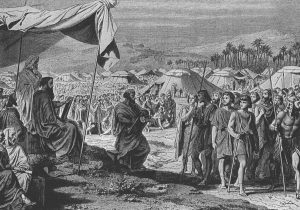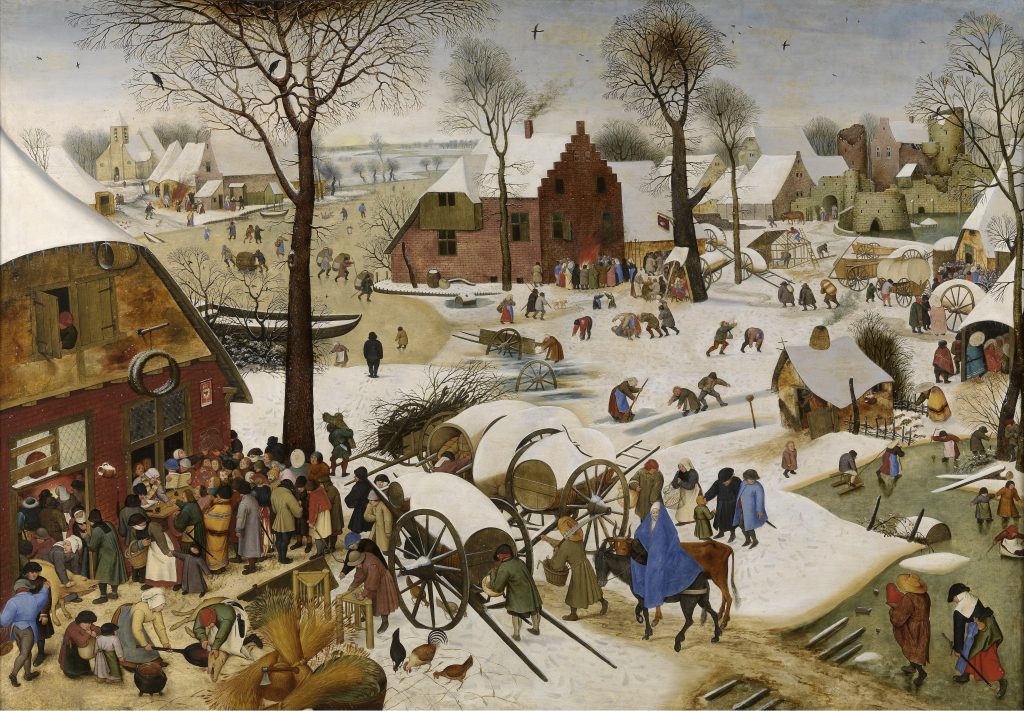A census is a survey that tallies the number of people in a given category, who live in a certain territory, or who belong to a certain demographic group, or who live under a specified authority.
History’s most famous census was the one that coincided with the birth of Jesus. But the process was already quite old by that time. Archeologists have found census records produced thousands of years before Christ.
Numbers have survived from ancient Egypt, Greece, China, India, and just about every society in between. A census was a common, useful tool for the purposes of taxation and the allotment of public services.
Every census matters, but not every census matters in quite the same way. And so in this, as in everything, the Scriptures invite a closer, deeper reading. This is most especially the case in 2020 as the United States conducts its own census, and millions of people ponder the morality of it, and the rights and wrongs of personal cooperation.
The Bible’s earliest recorded census took place almost a millennium and a half before Christ, and God commanded it. The Lord had recently liberated the Israelites from slavery in Egypt, and he was reconstituting them as a nation of 12 tribes with common worship.
Each of the tribes would have to pay its share of subsidy for the tabernacle, the portable shrine that was the sanctuary of God’s presence. Each of the tribes would have to contribute animals for sacrifice. What was shared in common must be borne equitably by all.
So God told Moses: “When you take the census of the people of Israel, then each shall give a ransom for himself to the LORD when you number them. … Each who is numbered in the census shall give this: half a shekel … as an offering to the LORD. Every one who is numbered in the census, from twenty years old and upward, shall give the LORD’S offering” (Exodus 30:12–14).
An entire book of the Bible is devoted to the results of Israel’s census after the Exodus. It is the aptly named Book of Numbers.
That census, coming from God, is given an entirely benign interpretation. God wills only the good of his people, and it was clear that this census, conducted for the sake of proper worship, would be beneficial to everyone.
Not all biblical censuses, however, are morally equivalent. Consider the census ordered by King David, as it is recorded in the Old Testament. In the First Book of Chronicles, David orders a census, as the narrative makes plain, at the instigation of Satan (1 Chronicles 21:1).
The king tells his military leaders to sweep through the entire country and number all the people. Surprisingly, he gets resistance. One of his generals, Joab, protests and bluntly tells the king that such a census would be a sinful act, with terrible consequences. But David insists, and he has his way.
Joab cannot finish the job, however, because he finds it repugnant. After surveying 10 tribes, he concludes, “In all Israel there were one million one hundred thousand men who drew the sword, and in Judah four hundred and seventy thousand who drew the sword” (1 Chronicles 21:5).
In the end, Joab is vindicated, but it is a bitter consolation. God punishes the whole nation for David’s evil.

What, though, was evil about David’s command? We have already seen that a census was a normal occurrence in the ancient world, and that God himself had commanded one. What made this one different?
The problem, it seems, was in David’s intention. He called his census entirely for the sake of self-aggrandizement. With God’s help he had unified Israel and gained dominion over a vast territory. He wanted numbers to brag about. He wanted to quantify his power.
Some scholars say, moreover, that the census also marked a fundamental shift in David’s foreign policy. He was moving away from diplomacy and toward military force. Readers will notice that his census counts only “men who drew the sword.”
David’s drama is relevant to the story of the famous census that came 1,000 years later, at the time of Jesus’ birth.
Caesar Augustus ordered that one. He was, at the time, the ruler of much of the known world. He wanted to enroll the subject peoples for the purpose of taxation. In the kingdom of Judea, most people identified strongly with their ancestral clans. So the regional official in charge of the project, a man named Quirinius, had people report to their traditional homelands, even if they were distant.
According to ancient records, both Joseph and Mary were descendants of King David. So they were required to report to the “city of David” (Luke 2:4; see also John 7:42).
Now, the clan of King David was known to be meticulous about preserving its history and passing it on to the next generation. So Joseph and Mary would have grown up intensely aware of the story of David’s sinful census. They would have grown up knowing that censuses in general were morally neutral, but individual censuses could be either good or evil.
This particular one was called by a foreign power, commanded by a Gentile, and enforced by a bureaucracy of idol worshippers. Some of the money collected through Roman taxation would surely be used for good things: paved roads, for example, aqueducts, and reservoirs for clean water. Another portion, however, would surely go to the construction of temples to the false gods of Rome.
It would not be surprising if some descendants of David refused to cooperate, and it would not be surprising if Mary and Joseph were encouraged to resist. Enrollment, after all, imposed an unreasonable hardship upon a woman in her ninth month of pregnancy.
The Holy Family certainly knew every possible justification and excuse for breaking the law regarding the census. Yet they complied, and their dutiful obedience was an occasion of grace for all the world. The census of Quirinius was the most fitting context for salvation by the Son of David.
Complying with a census is never a pleasant thing. Almost every census is associated with taxation, which no one likes. But everyone likes roads in good repair, clean water, efficient trash removal, and so on.
In the Letter to the Romans, St. Paul spelled out principles for cooperation with government initiatives. “Let every person be subject to the governing authorities. For there is no authority except from God, and those that exist have been instituted by God” (Romans 13:1).
He goes on from there at some length. But Paul didn’t invent these principles. They are implicit in the actions taken by the Holy Family at the dawn of our salvation.

